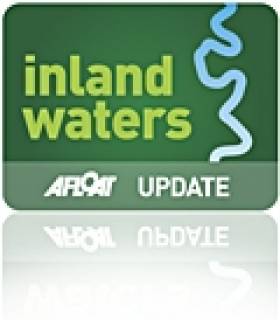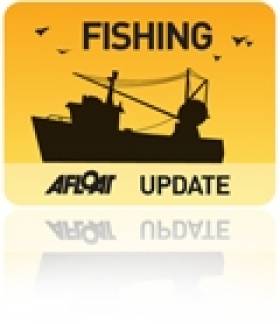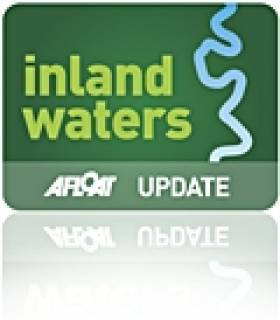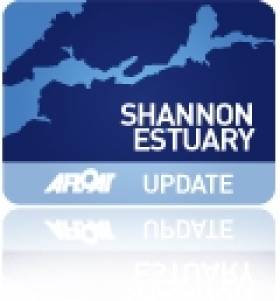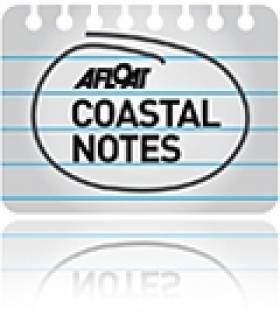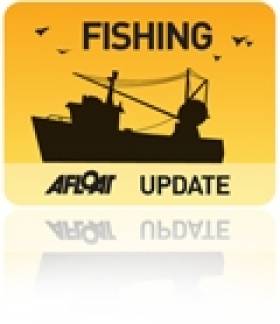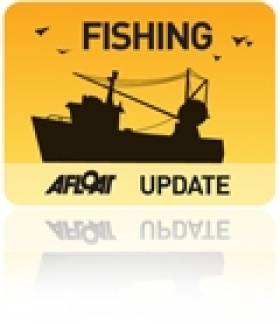Displaying items by tag: fisheries
#Marine - 'Foods of marine origin' are covered by the new call for research proposals under the Government's funding programmes, as announced by Marine Minister Simon Coveney on Tuesday.
In addition, the minister announced his intention to co-fund projects related to the marine sector with the Marine Institute.
Minister Coveney said that "co-funding arrangements between research funders, where appropriate, are logical in the context of the National Research Prioritisation process and, in this instance, it makes perfect sense for my department and the Marine Institute to come together to fund research relating to marine origin foods”.
The new call for research proposals, in general, aims to build and maintain research capability in the Irish public research system, which contributes to underpinning the sustainability and competitiveness of the Irish agri-food, forestry and fisheries sectors and the achievement of growth targets set out in the Food Harvest 2020 plan.
Apart from the marine food sector, areas covered by the call include animal and crop production, food and health, forestry, the wider bio-economy as well as the safety, quality, integrity and sustainability of the supply chain.
Minister Coveney added: “I have no doubt that the research community will take full advantage of this opportunity by submitting excellent proposals and I look forward to following the process over the coming months.”
The deadline for proposal applications is Tuesday 7 May at 1pm. All documentation in relation to the call for proposals is available on the Research Section of the Department of Agriculture, Food and Marine website.
Minister Seeks Directors for Inland Fisheries Board
#inlandfisheries – The Minister for Communications, Energy and Natural Resources, Mr. Pat Rabbitte T.D., is inviting expressions of interest from suitably qualified and experienced persons interested in being appointed to the inland fisheries board.
The Board of directors performs key roles in relation to the direction, leadership and corporate governance of each State body. While the diversity of roles and responsibilities of individual bodies precludes a uniform list of characteristics or skills for prospective directors, those expressing interest in serving on the board of a State body should (in addition to any criteria specified in the statutes governing individual bodies) have demonstrable competence, knowledge or experience at a senior organisational level and/or recognised management experience and/or skills (e.g. law, finance, etc.) in a company/organisation.
By submitting an expression of interest the applicant accepts that appointments are made in the exercise of a statutory discretion, that the Minister is not obliged to consider the expressions of interest offered, that he is not confined to making an appointment from amongst those who have expressed an interest and is not bound by any statement set out in the notice. Vacancies on boards of such bodies can arise due to the conclusion of the period of appointment of Board members or as casual vacancies arise. Expressions of interest will be kept on file and considered as appointments arise.
Expressions of interest, including a curriculum vitae and a statement of suitability, should be sent by email to: [email protected] and should indicate the State Board s/he wishes to apply for, provide a brief outline of skills, competencies and qualifications and a short statement outlining why s/he wishes to be considered for a position on the board. The Department will acknowledge receipt of such applications.
Marine Minister Opens Major Bioeconomy Stakeholders Conference
#Bioeconomy - Minister for the Marine Simon Coveney today (14 February) opened a major Stakeholder Conference on the Bioeconomy in Dublin Castle.
The conference - titled 'Bioeconomy in the EU: Achievements and Directions for the Future' - was jointly organised by the EU Commission and the Department of Agriculture, Food and the Marine on behalf of the Irish Presidency of the European Union.
Commissioner Máire Geoghegan-Quinn also addressed the delegates at the opening of the conference, which brings together all the major stakeholders in the bioeconomy from Ireland, across Europe and beyond, including researchers, educationalists, policymakers, industry representatives and civil society.
The purpose of the conference is to take stock of progress on implementing the EU Bioeconomy Strategy, which was launched 12 months ago by Commissioner Geoghegan-Quinn, and to promote informed public debate on the future development of the bioeconomy.
Setting the broad context, Minister Coveney said the “grand societal challenges of the 21st century place enormous pressures on all of us to change the way we do things at a member state, European, and indeed global level. Our objective is clear... we need a more innovative and low emissions economy, reconciling demands for sustainable agriculture and fisheries, food security and the sustainable use of renewable resources for industrial processes, while protecting the environment.”
The minister added that in Ireland’s case “the Government’s Policy Statement, 'Delivering our Green Potential', adopted last year, commits us to developing a Bioeconomy Strategy as part of a broader strategy on the Green Economy. This work will be progressed over the coming months overseen by the Cabinet Committee on Climate Change and the Green Economy."
Referring to the fact that the marine sector, along with agri-food and forestry, helps form the backbone of the bioeconomy in Ireland, the minister recalled the Think Green, Act Smart, Achieve Growth philosophy of Food Harvest 2020 and went on to say that “by applying these principles along the entire bioeconomy value chain, we can exploit the full potential of our rich natural resources in a sustainable manner for our own economic advantage while also contributing to meeting the increasing global demand for food.”
Minister Coveney pointed out that Ireland is making steady progress in implementing the various actions foreseen across the three pillars of the EU Bioeconomy Strategy.
“My colleagues in Government and I remain fully supportive of research and innovation and understand the crucial role it plays in underpinning growth in the bioeconomy,” he said, adding that he was “delighted to report that several of the areas prioritised for future Exchequer funding under the National Research Prioritisation Exercise related to the bioeconomy, including 'Sustainable Food Production & Processing' and 'Manufacturing Competitiveness'."
Commissioner Geoghegan-Quinn stressed that "the bioeconomy's employment potential can certainly kick-start economies and reinvigorate communities in some of our most peripheral and deprived areas".
She added that "an economy based on biological resources is also the newest economy... it is a crucible of new technology and innovation, leading the way in the application of information technology, biotechnology and the life sciences while in many cases blending these with existing knowledge and expertise" and that “it is in the member states and regions that the greatest work must be done.”
Marine Minister Welcomes Vote on Common Fisheries Policy Reform
#CFPReform - Minister for the Marine Simon Coveney, in his capacity as President of the European Council of Fisheries Ministers, last week welcomed the vote by the European Parliament on the reform agenda for the Common Fisheries Policy (CFP) which has been prioritised for delivery by the Irish EU presidency.
The vote, which is seen a major step forward in the CFP reform process, follows the minister’s address to parliament on Tuesday last. At the address the minister appealed for all parties to work together towards an agreed CFP reform package to be delivered during the period of Ireland’s presidency.
These reforms, which prioritise long term sustainability of fishing stocks, elimination of the controversial practice of discards (dumping at sea) and a switch to long-term (scientifically based) planning for fisheries, were approved by the parliament on Wednesday 6 February.
The decision of the parliament follows the minister’s address last Tuesday during which he identified the reforms as a major priority on the Irish Government’s EU presidency agenda.
Minister Coveney stated: “I am delighted that the parliament has today decided to back these necessary and timely reforms to the Common Fisheries Policy and that the case for reform outlined in my recent address has been accepted in an agreed manner.
"I am particularly encouraged that this vote has occurred during the Irish EU Presidency. This shows the pivotal role which Ireland can play in influencing broader European Policy and in bringing together divergent views towards an agreed reform package for the CFP.
"Ireland has set out an ambitious work programme aimed at delivering an agreed reform package for the CFP by the end of June. This objective can only be realised if [European] Parliament, Council and the Commission work together focusing on the bigger picture of an agreed reform agenda to benefit all of Europe’s citizens.”
During his address to the plenary session of European parliamentarians, Minister Coveney expressed his view that a momentum was now gathering behind the drive to deliver an agreed reformed CFP package by the end of June.
Acknowledging to the parliament that he had set out an ambitious work programme for his presidency, the minister accepted that differences remain between the European Council and Parliament, particularly on the question of multi-annual fisheries plans.
Minister Coveney emphasised the significant areas of common ground between both institutions and his belief that this would eventually lead to an agreed way forward on most aspects of the reform package. He stressed that it was only in a framework of mutual cooperation and flexibility that the objective of a reformed CFP which prioritises long term fisheries sustainability could be delivered in the lifetime of the current Irish Presidency.
The minister acknowledged the challenges ahead and emphasised the importance for the EU Parliament, Council and Commission to work together on all the issues including delivering on maximum sustainable yield, the elimination of discards and regionalisation.
Following an exchange of views, the minister sought support for his objective of achieving political agreement by the end of June in addition to acceptance of the need for a different and more effective way of working to deliver on what is a commonly held objective. He committed to working constructively with the parliament on all outstanding issues.
Waterford Farmers Prosecuted Over In-Stream Works On River Nier
#InlandWaterways - Two Waterford farmers have been successfully prosecuted by Inland Fisheries Ireland (IFI) over unauthorised in-stream works on the River Nier, a stretch of water important to salmon numbers in the south-east.
At a sitting of the District Court held at Clonmel on Tuesday 15 January, Oliver O'Gorman and Michael O'Gorman - of separate addresses in Ballymacarbry, Co Waterford - were convicted by Judge Terence Finn and ordered to pay fines and costs.
The prosecution followed investigations into discolouration and turbidity detected in the main channel of the River Nier on the evening of Saturday 24 March 2012.
Patrick Kilfeather, senior fisheries environmental Officer with IFI, told Judge Finn it had been found that Oliver O'Gorman removed gravel from the Nier and used this in the construction of a roadway through his farm, while Michael O'Gorman had removed boulders and rocks from the river upstream to use in bank protection works on his farm.
Additionally, the court was told that Michael O'Gorman had dug out the bed of a tributary of the Nier, and that the tributary in question was a very important salmon producing water.
In reply to questions put to him by Peter T Reilly, solicitor for IFI, Kilfeather told the court that had IFI been approached by the farmers concerned, advice and guidance would have been provided and it would have been possible to undertake certain works under IFI supervision during the period from July to September.
Dolph McGrath, solicitor representing both defendants, entered a plea and submitted they were hard working young farmers who had learned an expensive lesson, and had not intentionally set out to cause environmental damage.
In passing judgement, Judge Finn noted that the works carried out had been ill-considered and ill-advised, adding that the defendants could have acquired the gravels and boulders they needed from a quarry as distinct from taking them from the river Nier.
He commented it was a pity the defendants had not sought advice from IFI and noted from Kilfeather's evidence that such advice and guidance would have been readily provided.
Michael O'Gorman was fined €1,000 and directed to pay legal costs of €671.75 and expenses of €760.97 to IFI. A second charge against him for works on the Nier tributary was marked proven and taken into account. Oliver O'Gorman was also fined €1,000 and directed to pay legal costs of €658.75 and expenses of €704.01.
Commenting on the circumstance of the prosecution, the regional director with Inland Fisheries Ireland said there is a general prohibition under the Fisheries Acts from interfering with river and stream habitat. In no circumstances is it permissible to remove materials from a river for use, as in this case, for construction purposes.
He said that IFI was seeking the assistance and co-operation of farmers and landowners, as the primary custodians of the natural environment, not to engage in works likely to have effects on the fisheries and aquatic environment. In this regard he acknowledged the many farmers and landowners who had and continue to make contact with IFI to ensure that works which they require to undertake can be done in an environmentally sustainable manner.
Illustrated Talks On Shannon's Natural Heritage Throughout February
#Shannon - MulkearLIFE and Inland Fisheries Ireland have announced details of a series of free illustrated talks taking place in Limerick throughout February on the extraordinarily rich natural heritage of Ireland, and in particular the Lower Shannon.
The talks form part of MulkearLIFE’s Environmental Education Programme, an outreach programme in local schools and the local community in the Mulkear catchment. The series will be hosted over four Tuesday evenings and will include leading experts sharing their knowledge on farming and conservation and biodiversity management.
Among the talks will be the fascinating story of Atlantic salmon in the River Shannon, presented by Dr Phil McGinnity on 12 February. Dr McGinnity is Beaufort Principal Investigator with UCC’s Aquaculture & Fisheries Development Centre, with more than 23 ears of experience in fisheries science and management, and his talk will outline new and extremely exciting research on the genetic make-up of various salmon types found in the Shannon. He will also examine the history of salmon fisheries on the Shannon. His talk should be of particular interest to anglers far and wide and anyone with a general interest in Irish biodiversity.
On 19 February, Colette O’Flynn will relate the scary story of what is emerging in terms invasive non-native animals and plants arriving into Ireland's coastal and inland waterways. O’Flynn is a research officer with the National Biodiversity Data Centre in Waterford. She manages the National Invasive Species Database for Ireland, which tracks non-native invasive animals and plants in Ireland. She is involved with many European and international invasive species information networks and has been involved with invasive species policy development for the European Commission. She previously worked in various areas in biodiversity education and awareness. Her talk should be of interest to a wide variety of people, especially anglers and those with an interest in Irish wildlife and general biodiversity.
The series of illustrated talks will conclude on 26 February with a talk by Eamon Cusack on building partnerships for sustainable fisheries on the Lower Shannon. Cusack is extremely well known in the fisheries world with over 35 years experience in inland fisheries management. As the former CEO of the Shannon Regional Fisheries Board, he encountered many of the challenges facing fisheries management, and has hands-on experience of policy development, strategic management, change management, enforcement, development and rehabilitation. This talk will focus on his recent work to bring together anglers and the ESB to provide to build effective and durable partnerships for sustainable fisheries. His talk should be of particular interest to local anglers and anyone with a general interest in conservation management and planning.
But the series begins on 5 February with a talk presented by Ruairí Ó Conchúir on conservation farming and biodiversity in the Upper Mulkear Catchment. Ó Conchúir is the manager of MulkearLIFE and has worked in land care management, rural development, farming for conservation and fisheries restoration work for over 20 years, including 10 years in Southern Africa. His talk will focus on the work of MulkearLIFE with farmers over the past three years, with a particular emphasis on partnership work with farmers to improve local habitats. The talk will also attempt to map out where upland farming in Ireland is heading and review work in other uplands parts of Ireland, and outline the likely implications are for upland communities, related farming and habitats post 2014. His talk should be of particular interest to anyone with a general interest in farming, the Irish uplands and the future of EU agri-environmental supports post 2014.
The venue for all talks is the Inland Fisheries Ireland office at Ashbourne Business Park, Dock Road, Limerick. There is plenty of free parking at the front of the building at night. Talks will commence at 8pm sharp and there is free admission to all talks. Further information regarding any of the talks may be obtained from the project [email protected] or from MulkearLIFE, Inland Fisheries Ireland (Limerick) at 061 300 238 or 087 062 5582.
Minister Welcomes Public Consultation on Fracking Research
#CoastalNotes - Minister for Natural Resources Fergus O’Dowd has welcomed the launch of a public consultation by the Environmental Protection Agency (EPA) on the proposed terms of reference for more detailed research to be carried out on the potential impacts of unconventional gas exploration and extraction on the environment, especially for inland and coastal fisheries.
Speaking last Friday, Minister O’Dowd said that he is particularly pleased that all interested parties, including individual members of the public, will have an opportunity to comment on the scope and objectives of this further research, thereby facilitating consideration of the broadest possible range of views.
Minister O’Dowd went on to say that “the detailed research to be commissioned by the EPA will build on other studies and research in this area and will inform future decision-making on any application that proposed the use of hydraulic fracturing in Ireland.”
Minister O’Dowd reiterated that until the EPA study has concluded and there has been time to consider its findings, the use of hydraulic fracturing in exploration drilling will not be authorised in Ireland.
IFI Seizes Illegal Bass and Nets Off Waterford and Wexford Coast
#FISHING - Inland Fisheries Ireland has in the last week seized illegally caught bass off the Wexford coast and illegal fishing nets off the Waterford coast.
While the specifics of these cases are not being released for legal and operational reasons, IFI says that the successful seizures are the result of "the flexibility and dedication of IFI staff".
The national fisheries body said that these types of seizures are often initiated following significant covert, intelligence-led policing operations which are carried out during both day and night time.
In both instances off-duty fisheries staff were quickly mobilised to execute the seizures.
The regional director at IFI praised the staff involved in the operation and described the seizures as very important in the protection of Ireland’s bass, salmon and sea trout resource.
It is widely held that illegal coastal fishing could have devastating consequences on the nation's valuable fishery resource.
#fisheries – The Sea-Fisheries Protection Authority (SFPA) will host a seminar entitled Pelagic Fisheries – Monitoring, Control and Surveillance from today, Tuesday 19th June to Thursday 21st June at their head office in Clonakilty. The seminar will include delegates from: the Norwegian Fisheries Directorate; the Irish Naval Service; the Marine Institute; Marine Scotland, the Scottish Control authorities; the National Bureau of Criminal investigation (NBCI); representatives from the Irish pelagic industry as well as the SFPA. The key objective of the seminar is to share information and best practice in terms of verifying compliance of pelagic fisheries at sea.
The first session takes place today, Tuesday 19th June and will involve a number of presentations including; an overview of Norway's and Ireland's fisheries control procedures; the fisherman's perspective on compliance and control; pelagic stocks and fisheries in the North East Atlantic from a scientific perspective and the origins, role and purpose of the EU/Norway Pelagic Technical Working Group.
On the second day the focus will be on best practices in fisheries control at sea and on landing. There will also be a discussion on lessons learnt from previous enforcement actions both in Ireland and Scotland.
The final day will involve a perspective of an industry group who have harnessed the benefit of compliance to achieve external accreditation of their fishery and associated labelling of their product. Following this, the seminar will focus on developing agreed action points and steps to implementation.
Andrew Kinneen, Board member with the SFPA said: "This seminar will provide an excellent opportunity for key representatives from Norway, Scotland and Ireland to share valuable information on how best to monitor the legal exploitation of pelagic fisheries around the coasts of Ireland. The SFPA wants to play our part in protecting the rich resources of mackerel, herring and other pelagic fish around the coasts of Ireland for the benefit of responsible fishermen. We need to ensure we have the best systems in place so that illegal practices such as high-grading are prevented. The effective monitoring and control of these pelagic fish stocks requires the close co-operation of Ireland with other Member States and with Norway. I am sure this seminar will help promote a level playing field of best practice amongst the participants. We look forward to a fruitful exchange of information and ideas on how we can best work together to protect the interests of legitimate fishermen.
The Irish seafood industry is vitally important to our economy - total sales of Irish seafood on both domestic and export markets, excluding direct landings for Irish vessels into foreign ports, amounted to €730 million in 2008 which represented 345,000 tonnes. Exports of Irish seafood for 2010 are estimated at €365 million. An estimated 75% of Irish seafood exports are sold in EU markets - markets outside of the EU are also of vital importance notably for Ireland's pelagic fleet which fishes mainly mackerel, horse mackerel, herring and blue whiting. Nigeria and Russia are among the main markets for these species. This seminar will seek to underline that good goverance overall and co-ordinated monitoring effort between Ireland and other countries is the way forward to safeguarding jobs and securing a profitable future for Ireland's fish catching and processing sectors."
Inland Fisheries Ireland Looking For Seasonal Fishery Officers
#JOBS AND CAREERS - Inland Fisheries Ireland (IFI) is seeking to recruit a number of staff as Fishery Officers nationwide for a maximum period of four months during 2012 and will shortly commence a process to fill these positions.
The Fishery Officer will be primarily concerned with the implementation and enforcement of the provision of the Fisheries Acts, Water Pollution Acts and other relevant statutory provisions.
He or she is required to provide, in co-operation with other fisheries staff, comprehensive conservation and protection services, as well as improvement, development and fisheries management support services, both inland and at sea, within any part of a fisheries district and/or any other area assigned within one or more fisheries districts.
The Fishery Officer is also expected to assist either directly or indirectly in fisheries-related research projects.
Salary at the first point of the Fishery Officer Scale is €22,349 plus an Unsocial Hours allowance, which will be paid at either 50% or 100% relative to the number of unsocial hours worked.
Applications should be mailed for the attention of Ms Sandra Doyle, REF: HR/FO/2012, Inland Fisheries Ireland, Swords Business Campus, Swords, Co. Dublin or by e-mail to [email protected] by the close of business on Tuesday 24 April 2012.
For further job details contact Sandra Doyle at 01 8842 612. Please note that late applications will not be processed.



























